|
Daily Life in Cambodia 2005
Daily Life (2001)
Daily Life (2002)
Daily Life (2003)
Daily Life (2004)
Daily Life (2006)
31 December 2005
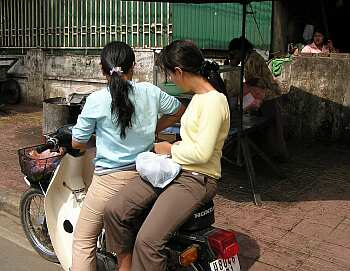 Cambodia doesn't have any drive-through restaurants yet. Partly that's because there are so few cars. Partly, too, it's because the main fast food is a bowl of noodles, hard to eat while driving! But some enterprising vendors manage to position themselves on the sidewalks at very good locations, like these women selling deep-fried bananas. The young women on a motorbike are making a purchase while waiting for the stop light to change. Cambodia doesn't have any drive-through restaurants yet. Partly that's because there are so few cars. Partly, too, it's because the main fast food is a bowl of noodles, hard to eat while driving! But some enterprising vendors manage to position themselves on the sidewalks at very good locations, like these women selling deep-fried bananas. The young women on a motorbike are making a purchase while waiting for the stop light to change.
Return to Top of Page
30 December 2005
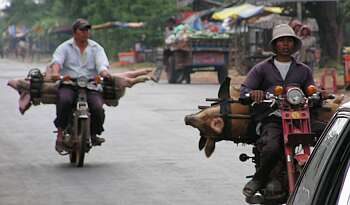
Motorcycle Passengers and Cargo #16 This Little Piggy Went to Market.... Pigs don't fly in Cambodia but they do ride motorcycles!
Return to Top of Page
27 December 2005
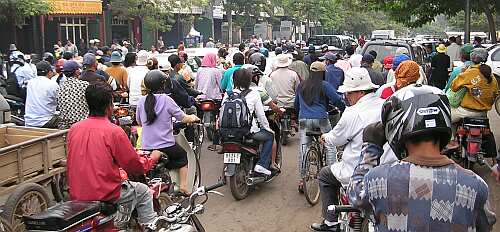 Morning traffic in Phnom Penh: Traffic may be bad
where you live but be glad you have rules! Return to Top of Page
24 December 2005
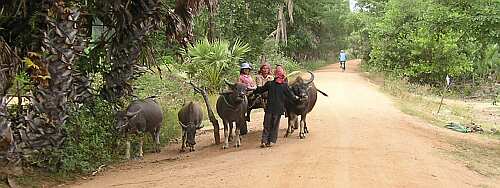 Scenes from the rice harvest in Kampong Chhnang Return to Top of Page
23 December 2005
Stuffing the bird
 A chicken processing plant operates near the apartment of Jim and Roberta McLaughlin in Phnom Penh. On his way to work one morning, Jim photographed this young man forcing a mixture of rice and water down the gullets of chickens before they are taken to the market (where they are sold by weight, of course). Gives a new meaning to stuffing the chicken. A chicken processing plant operates near the apartment of Jim and Roberta McLaughlin in Phnom Penh. On his way to work one morning, Jim photographed this young man forcing a mixture of rice and water down the gullets of chickens before they are taken to the market (where they are sold by weight, of course). Gives a new meaning to stuffing the chicken. Return to Top of Page
20 December 2005
 A wave of bicycles flows out of a school at lunch time in Kampong Chhnang province, a scene repeated in hundreds of schools all over Cambodia every school day. Return to Top of Page
16 December 2005
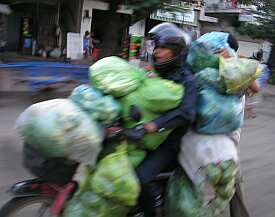
Motorcycle Passengers and Cargo #15 I'm sorry this picture isn't sharper because it's one of the most overloaded motorcycles I've ever seen. It came up on me too quickly, though, and I had to just grab the shot. At least one of the two people can see where they're going!
Return to Top of Page
15 December 2005
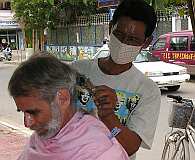
Getting a haircut in Phnom Penh is an open-air experience that costs 50¢. Click here for a photo series. Return to Top of Page
12 December 2005

"The doctor is in." A patient approaches the local doctor in his street-side shop. And I complain about U.S. doctors in their jeans and T-shirts!
Return to Top of Page
9 December 2005
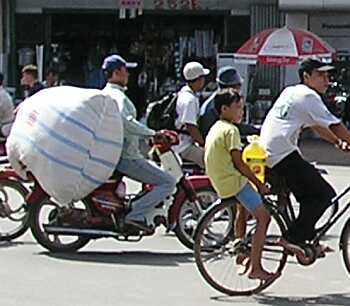
Motorcycle Passengers and Cargo #14 Hey, Mister, your airbag's installed wrong!
Return to Top of Page
30 November 2005
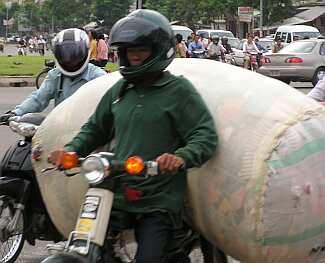
Motorcycle Passengers and Cargo #13 I barely had time to grab this shot. I was sitting at a traffic light on the back of my motorcycle taxi when this man turned left onto our street. Quite a large load he has! Notice he is sitting on the very front tip of his seat, practically against the handlebars.
Return to Top of Page
28 November 2005
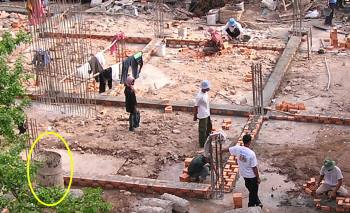 People in Cambodia must have some of the strongest immune systems in the world. We in the West probably overdo the cleanliness thing (the increase in asthma in recent years is being blamed on the use of anti-bacterial soaps), but there is little sense of hygiene in Cambodia and most people would not be able to explain (or accept) the concept of disease-causing germs and bacteria. At the construction site next to my house, there is a 55-gallon drum of water (yellow circle) that is filled with a hose every morning. The 40+ young men who live on the site use it for taking "showers" with a pan of water; washing their clothes; cooking their food; brushing their teeth; combing their hair; washing their tools; etc. All day long it sits open to the dust and dirt that fill the air, but for them it's just a normal source of water. People in Cambodia must have some of the strongest immune systems in the world. We in the West probably overdo the cleanliness thing (the increase in asthma in recent years is being blamed on the use of anti-bacterial soaps), but there is little sense of hygiene in Cambodia and most people would not be able to explain (or accept) the concept of disease-causing germs and bacteria. At the construction site next to my house, there is a 55-gallon drum of water (yellow circle) that is filled with a hose every morning. The 40+ young men who live on the site use it for taking "showers" with a pan of water; washing their clothes; cooking their food; brushing their teeth; combing their hair; washing their tools; etc. All day long it sits open to the dust and dirt that fill the air, but for them it's just a normal source of water.
Return to Top of Page
25 November 2005
 A recent survey rated the quality of life of 127 cities around the world. Vancouver was rated the most desirable city and Port Moresby in Papua New Guinea was rated the least livable. Phnom Penh came in at #122, two places behind Harare, the capital of Zimbabwe, and just a few places from the bottom. The 127 cities were evaluated on their stability, health care, culture, environment, education, and infrastructure. Phnom Penh's score was dragged down by its poor quality of health care, poor availability of consumer goods and services, the prevalence of petty crime, and its poor general education. A recent survey rated the quality of life of 127 cities around the world. Vancouver was rated the most desirable city and Port Moresby in Papua New Guinea was rated the least livable. Phnom Penh came in at #122, two places behind Harare, the capital of Zimbabwe, and just a few places from the bottom. The 127 cities were evaluated on their stability, health care, culture, environment, education, and infrastructure. Phnom Penh's score was dragged down by its poor quality of health care, poor availability of consumer goods and services, the prevalence of petty crime, and its poor general education.
Return to Top of Page
11 November 2005
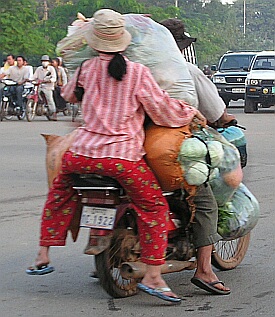
Motorcycle Passengers and Cargo #12 A load of vegetables on its way to market, early in the morning. On top of the unsafe load, the driver was running the red light, the expected practice before 6:00 or 6:30 AM, even though there is a lot of traffic at that time. Return to Top of Page
19 November 2005
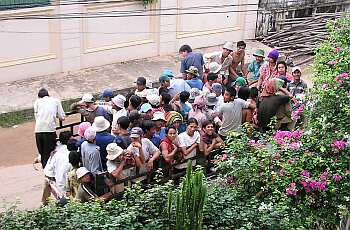
Hey, that guy in the blue hat doesn't have his seat belt on! (About fifty young men being driven to a construction site in the back of an open truck.)
Return to Top of Page
11 November 2005
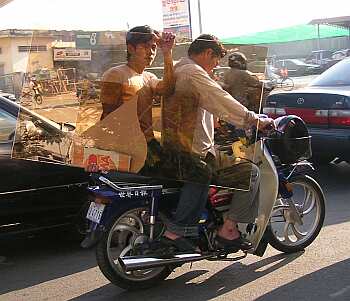
Motorcycle Passengers and Cargo #11 The right side passenger window on this motorcycle has always been a bit loose, but it sure is big! What a view! And it's tinted, too! Return to Top of Page
7 November 2005
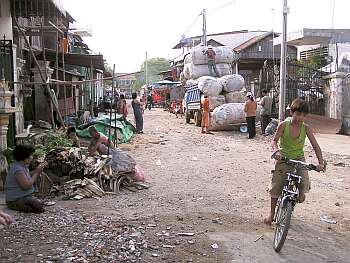
This is the street next to my house. I cut through here every day on my way to the deaf office. Notice the pile of firewood by the woman and man in the left foreground. Not all of these houses have electricity and the largest majority of them would use this kindling or charcoal for cooking their meals.
Return to Top of Page
4 November 2005
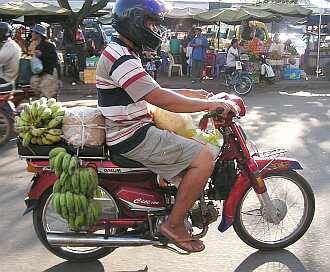
Motorcycle Passengers and Cargo #10 A man returning from the market with a load of groceries. How else are you going to carry them if you can't afford an SUV?
Return to Top of Page
28 October 2005
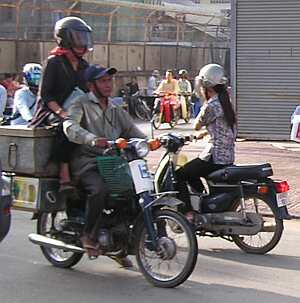
Motorcycle Passengers and Cargo #9 Another dangerous load on a motorcycle. The metal box the woman is sitting on is probably full of fresh fish. This is the normal way they are transported from wholesalers to restaurants and markets throughout Phnom Penh. The woman has a good view(!) but her elevated perch certainly throws off the center of balance for the motorcycle. At least she has on a helmet. That's a start. As for dangerous loads, people will do what they have to do to make a living.
Return to Top of Page
28 October 2005
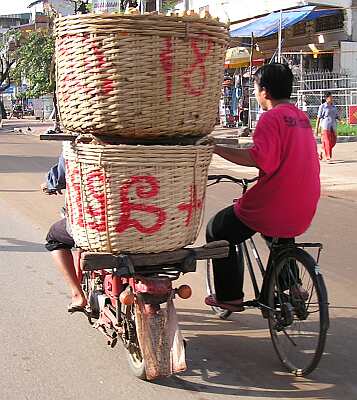
Motorcycle Passengers and Cargo #8 Early mornings are good times to catch motorcycles with large and unusual loads as their drivers make deliveries to markets and shops as they open. Here two huge baskets of French bread baguettes, uncovered, of course, make their way from some bakery to the people who sell them on the street. This driver is hauling not only the bread but is also towing a bicyclist. Note the lack of a license plate on the motorcycle and the plastic bag, weighted with rocks, used as a mud flap in the rear.
Return to Top of Page
19 September 2005
Scenes from the Bokor neighborhood where I live.
Return to Top of Page
9 September 2005
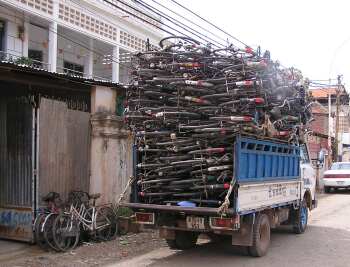 Remember trying to see how many people you could squeeze into a phone booth? Or a Volkswagen? Well, how many bicycles can you put on a truck? The answer: as many as you want as long as they clear the overhead wires.
Return to Top of Page
14 June 2005
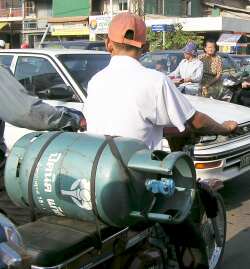
Motorcycle Passengers and Cargo #7 Nothing is too big, too bulky--or too dangerous--to carry on the back of a motorcycle. Only the westerners in Phnom Penh have an extra propane tank in their homes. For the local people, when your tank runs out, you call the local dealer and within ten to fifteen minutes a motorcycle pulls up at your house and you have a new tank. Not very safe, but really efficient! Note the tank is fastened down by rubber strips cut from an inner tube. And it's not unusual to see three or four tanks on one motorcycle.
Return to Top of Page
14 June 2005
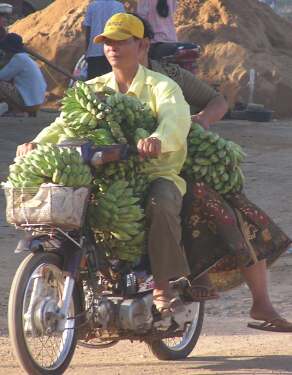
Motorcycle Passengers and Cargo #6 Early in the mornings in the provincial towns, lots of fruit and produce makes its way to the main markets. Bananas grow everywhere in Cambodia but even people who have banana trees on their property need to buy more because there are several months between successive crops. Motordupe (motorcycle taxi) drivers are very adept at handling large and cumbersome loads in addition to one or more passengers. This would be considered just a medium-sized load for a motorcycle.
Return to Top of Page
13 June 2005
 While walking a dusty road to the school where our deaf classroom is located in the province of Svay Rieng, I noticed a patch of clover in the ditch, and then noticed that most of the clovers are four leaf. The clovers there were a little bit bigger than the American variety. And given the state of the country, they're also a lot less lucky! While walking a dusty road to the school where our deaf classroom is located in the province of Svay Rieng, I noticed a patch of clover in the ditch, and then noticed that most of the clovers are four leaf. The clovers there were a little bit bigger than the American variety. And given the state of the country, they're also a lot less lucky!
Return to Top of Page
12 June 2005
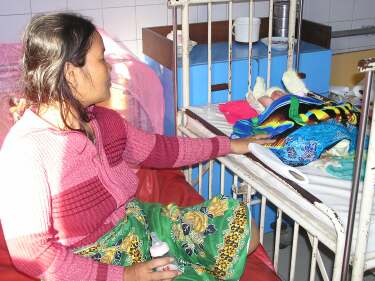 Friday and Saturday (yesterday), we asked all seven of our teachers to come from the provinces to Phnom Penh to prepare final examinations for our students later this month. Siya, who was supposedly 8 months pregnant, came from Svay Rieng for the beginning of the meetings Friday afternoon. But at 5:45 AM Saturday morning, I got a call from our education team leader that she had gone to Calmette Hospital at 5:00 AM. He called me back at 10:00 to say she had had a baby girl, her fourth child. Friday and Saturday (yesterday), we asked all seven of our teachers to come from the provinces to Phnom Penh to prepare final examinations for our students later this month. Siya, who was supposedly 8 months pregnant, came from Svay Rieng for the beginning of the meetings Friday afternoon. But at 5:45 AM Saturday morning, I got a call from our education team leader that she had gone to Calmette Hospital at 5:00 AM. He called me back at 10:00 to say she had had a baby girl, her fourth child.
Today I went to see Siya and her husband (who rushed up to Phnom Penh) and the baby. Everyone is doing fine. I wonder how Cambodian babies survive, though. The temperature was in the high 90ºs today but notice the baby has on a knitted hat and mittens and is under two blankets, both folded several times. And already Siya has started the baby on a bottle. She said they are heading back to Svay Rieng in the morning because the hospital is too expensive. Calmette charges $45 for the birth of the baby and $5 a day for the room.
Return to Top of Page
11 June 2005
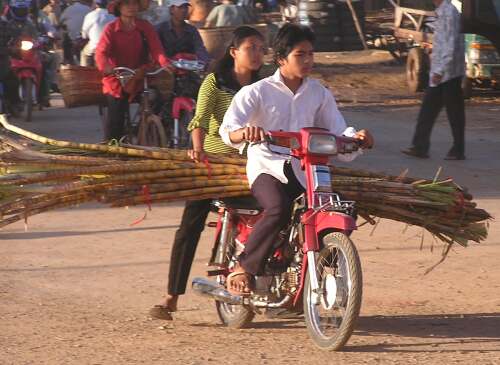 Motorcycle Passengers and Cargo #5 A careless driver can do a lot of damage to himself and others when carrying a load of sugar cane! The cane is cut into two-foot lengths, the covering scraped off, and then put through a squeezing machine to extract the juice into a glass to sell to the passers-by.
Return to Top of Page
9 June 2005
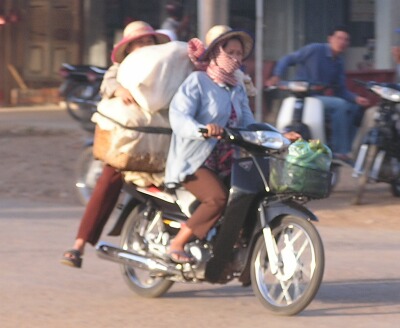 Motorcycle Passengers and Cargo #4 Two women on a motorcycle in the early morning, carrying some goods to a market or a shop.
Return to Top of Page
7 June 2005
 Today I went to the post office to buy stamps. I would like to ask our office manager to get them for me when he goes to the post office every day to pick up the mail (there is no mail delivery in Cambodia), but the counter clerks always want to charge him more than the the actual costs of the stamps. I told the clerk that I wanted ten 2600 riel stamps. 2600 riel is the amount for a letter to the United States. She didn't have any 2600 riel stamps--they don't print that value--so I was expecting some combination that would equal 2600 riel. But to my surprise she gave me ten 1000-riel stamps and ten 1800-riel stamps and said just to use them even though it was putting too much postage on the letters. I only paid 26,000 riel for them but got 28,000 riel worth of stamps. It's no matter to the clerk. As long as there's enough on the letter, it's OK. In any developed country to deliberately sell the wrong value of stamps for the amount received would cause all kinds of problems! Not in Cambodia!
Return to Top of Page
3 June 2005
 In a park in the town of Sisophon, a man gathers edible plants for his family to eat. Many, many poor families eat rice with only a few vegetables for their daily food. They can't afford any meat or fish. The very poorest have just their rice. In a park in the town of Sisophon, a man gathers edible plants for his family to eat. Many, many poor families eat rice with only a few vegetables for their daily food. They can't afford any meat or fish. The very poorest have just their rice.
Return to Top of Page
2 June 2005
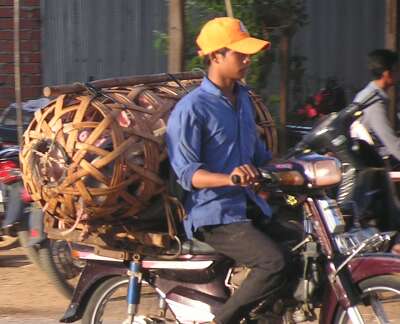 Motorcycle Passengers and Cargo #3 Following up the photos of the chickens and the acetylene tank on the back of motorcycles, here is a picture of two pigs on their way to market on the back of a motorcycle. There is little sensitivity to or concern about the welfare of animals here, and some pigs are transported under horrendous conditions.
Return to Top of Page
20 May 2005
 I took some photos in the lobby of the Monorom Hotel in Svay Rieng on one of our previous trips to that province to evaluate our teacher there, but I don't know if I ever put any of them on the website. I took some photos in the lobby of the Monorom Hotel in Svay Rieng on one of our previous trips to that province to evaluate our teacher there, but I don't know if I ever put any of them on the website.
The hotel has a huge lobby with almost no furniture. There is a small television at one end of the room and staff lie on the bare floor to watch it. Near the stairway there is a desk (where the man is seated in this picture) that serves as the front desk and reception area. The rest of the room is basically empty. Until today. When we were leaving to return to Phnom Penh about noon, there were almost a hundred motorcycles and bicycles parked IN the lobby! There was some kind of meeting being held in a second-floor meeting room, and I guess everyone figured bringing the motorcycles inside the building was the safest and easiest option.
Return to Top of Page
17 May 2005
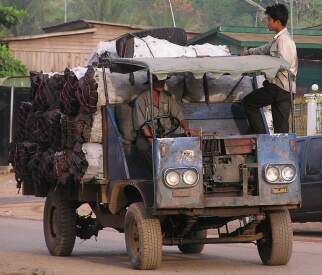
A truckload of charcoal rolls into the town of Sisophon in Banteay Meanchey Province in northwestern Cambodia.
Return to Top of Page
15 May 2005
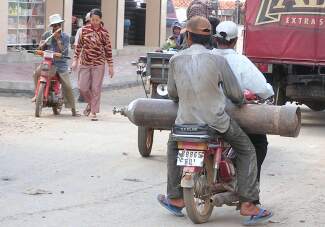 Motorcycle Passengers and Cargo #2 Motorcycle Passengers and Cargo #2
The May 9th photo of the chickens riding pillion on a motorcycle made me think I should start a series of photos of all people and things that appear on motorcycles here. Here an acetylene tank is transported down a street in the town of Svay Rieng. The motordupe (motorcycle taxi) driver in the background is nibbling on a piece of sugar cane while waiting for a passenger.
Return to Top of Page
9 May 2005
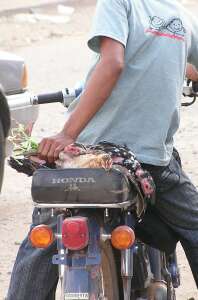
Motorcycle Passengers and Cargo #1 Two chickens about to take their last ride on the back of a motorbike in Kampot in southern Cambodia. A lot of the foreigners here have worried about eating chicken because of the cases of bird flu confirmed in Cambodia, but our resident lay missioner microbiologist advises us that there is no danger unless we're regularly handling live poultry. Notice the motorbike has no license plate. They're considered rather optional in Cambodia.
Return to Top of Page
30 April 2005
The Rainy Season Starts
 The last two weeks we have had some cloudy periods when it almost looked like it might rain but nothing happened. But on Wednesday last week there was a quick shower after dark and then on Friday it rained finally! It was a thunderstorm rather than a regular rain, but it marked the end of the dry season and the arrival of the wet season which will continue now till the end of September or so. It's about time. The rice crops are really needing water and the rain will settle some of the dust. In the photo a young boy on his way to school waits under a tree for the heaviest rain to subside before continuing on his way.
Return to Top of Page
27 April 2005
Cambodian Fashions
Standard two-piece pajamas are considered perfectly acceptable outerwear in Cambodia. In fact, I don't know if they are ever worn as sleepwear (mainly because I'm not in people's houses at night to see!). They are certainly common on the street, however, in all varieties--cotton, silk, satin, etc., probably every material except flannel. Maybe the flannel is considered just too hot for the Cambodian climate. In these four pictures, women are wearing pajamas at the DDP office, at our DDP classroom in Svay Rieng Province, at the market, and on the ferry crossing the Mekong River.
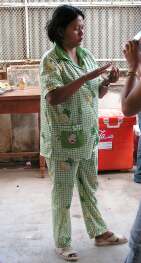 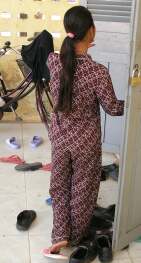  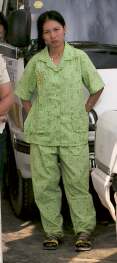
Return to Top of Page
26 April 2005
Would you hire the guys who painted the walls and curbs
in the Maryknoll parking lot?
A few days ago the two guards at the Maryknoll office painted the curb and wall inside and outside of the compound. I don't know if anyone asked them to, or if it was their own initiative. Probably someone asked because they wouldn't have had any money to buy paint.
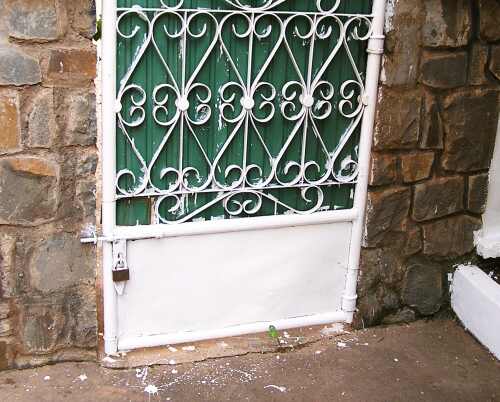 Khmer culture's sense of aesthetics is quite different from that found in the West. There is little sense of order, regularity, and finesse. Life is lived in broad, rough strokes, probably a reflection of their chaotic history of the last fifty years and of the effects of poverty which has little time for anything beyond survival. When painting this gate, it would never have occurred to the painters to put a piece of cardboard behind the grillwork to keep the white paint from being brushed onto the green behind it. Or to NOT paint the lock.
|
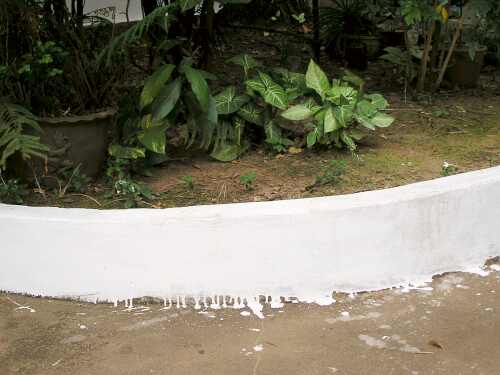 |
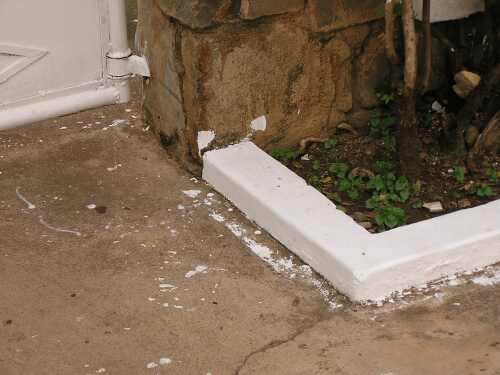 To keep the paint off the concrete pavement would almost be a joke. Why would you want to do that? Floors and the ground are supposed to be dirty! And why would you want to keep the paint off the natural stone of the wall? There is nothing jarring about these photos to most Khmer people. |
Return to Top of Page
12 April 2005
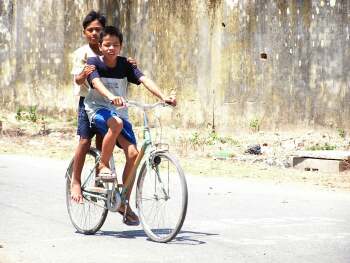
Bicycles are a really important part of life here, the primary transportation for the poor. Some of our deaf students pedal 10-20 miles each way to school every day. Here two boys pass the deaf school with a bicycle fitted with special axle extensions so a passenger can stand on the back axle for a lift.
Return to Top of Page
27 March 2005--Mango Report #2
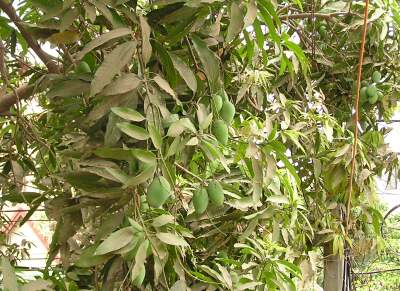 Here are the mangoes growing on the tree in our front yard at the house in the Bokor area of Phnom Penh. I had planned to offer new pictures every week, but last Wednesday, the due date, was really busy with our donors from Japan and the preparations for Holy Week, so it's now ten days since the first photos were taken. Here are the mangoes growing on the tree in our front yard at the house in the Bokor area of Phnom Penh. I had planned to offer new pictures every week, but last Wednesday, the due date, was really busy with our donors from Japan and the preparations for Holy Week, so it's now ten days since the first photos were taken.
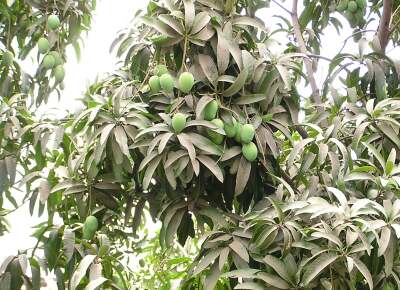 Actually, to be truthful, there is not much noticeable difference between the mangoes ten days ago and now. Some of them are getting black spots on them, but they seem almost the same size and color. I will be away in the provinces and then in the US most of the time till April 7th, so the next report won't be till then. I hope the anticipation is not too much! Actually, to be truthful, there is not much noticeable difference between the mangoes ten days ago and now. Some of them are getting black spots on them, but they seem almost the same size and color. I will be away in the provinces and then in the US most of the time till April 7th, so the next report won't be till then. I hope the anticipation is not too much!
Return to Top of Page
23 March 2005
I have a big presentation to make tomorrow to the president of the Nippon Foundation who funds some of our sign language research, and tonight I hurried home from the Maryknoll meeting to put together some graphics in a PowerPoint style. I was half way through it when the electricity went off.
The good news: I found out that the old decommissioned paschal candle I had at home, getting ready for the Easter vigil on Saturday, puts out a LOT of light to work by!
The bad news: the new beer garden restaurant right down the street has their own generator. When the power went off in the neighborhood, they didn't miss a beat of their obnoxious music blasting through the area.
Return to Top of Page
17 March 2005--Mango Report #1
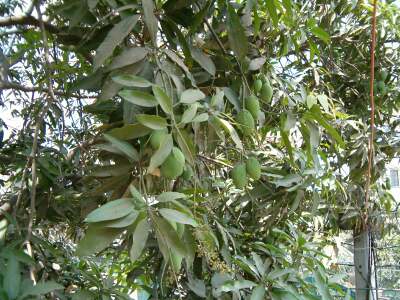 Just what you've been waiting for!! It's the first of the weekly illustrated mango reports! We have mango trees in front of our new house and on the side. This picture shows some of the mangoes on the front tree. Notice how they grow in clusters rather than evenly distributed around the tree. Just what you've been waiting for!! It's the first of the weekly illustrated mango reports! We have mango trees in front of our new house and on the side. This picture shows some of the mangoes on the front tree. Notice how they grow in clusters rather than evenly distributed around the tree.
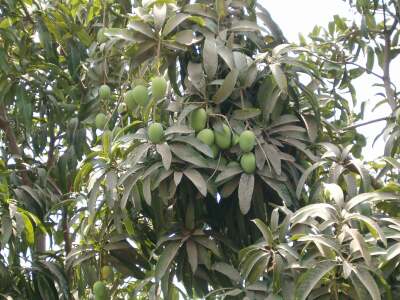 These mangoes are growing on a tree on the side of our house. A lot of people like to eat them at this stage, with salt. Many Khmer people go around with unripe "green mangoes" sold with a little packet of salt. I prefer to have them yellow and ripe myself. These mangoes are growing on a tree on the side of our house. A lot of people like to eat them at this stage, with salt. Many Khmer people go around with unripe "green mangoes" sold with a little packet of salt. I prefer to have them yellow and ripe myself.
Come back next Wednesday to see how much they grow in a week! Oh, what excitement!
Return to Top of Page
4 March 2005

Of every 1,000 Cambodian children who enter the first grade, only 20 finish high school. Many do not even get into school, like these two street kids playing in the road in front of my house. It was early morning and their bags for collecting trash were still empty, but for whatever reason the only thing on their minds at that time was rough-housing and having the kind of fun only best friends can enjoy.

Return to Top of Page
28 February 2005

There are at least six satellite TV dishes visible on the roof of one nondescript little shop in Sihanoukville. What in the world do you think is going on inside that building?
Return to Top of Page
10 February 2005 -- Grid Lock
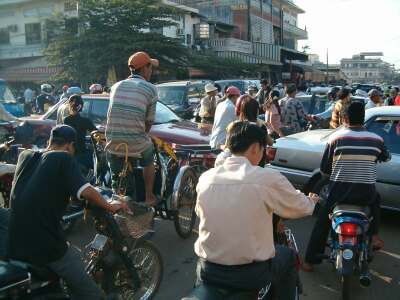 Every morning Phnom Penh experiences classic grid lock at various intersections. Few streets are paved so all the traffic tends to use those few streets, and at intersections like this one--where two paved streets intersect--grid lock is a daily occurrence. There are no stop signs in Phnom Penh--and even less expectation that anyone would stop unless they absolutely can't move--and there are only a few traffic lights, so the continuously flowing stream of traffic is subject to frequent disruptions such as this. Notice the mixture of cars, motorcycles, and cyclos (three-wheeled pedal powered vehicles) in this mess. I'm working on another photo of grid lock, adding arrows and things, to show just what happens at these intersections.
Return to Top of Page
5 February 2005
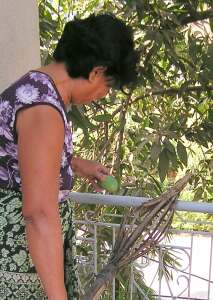
The house where I live now is fortunate to have mango trees in the yard, and we're now in the middle of mango season. This afternoon our landlady was up on our second-floor porch with a bamboo fruit picker. One end of a long bamboo pole is split into staves which are then expanded into an oval-shaped bulge in the pole. One side of the bulge is cut away and mangoes are caught in that opening and then pulled off the branches. It's an interesting and creative tool, very appropriate technology for this region.
Return to Top of Page
4 February 2005
Far from their being a shortage of rodents to eat (cf. 29 January below), an infestation of field mice is threatening rice crops in Kampong Cham in central Cambodia. There the Agricultural Minister is offering a bounty of 100 riel (2½¢) for each tail of a mouse that villagers turn in. The bounty is to encourage farmers to trap mice rather than poison them, and the minister noted that the trapped mice could also be used for food.
Return to Top of Page
3 February 2005
A 10-pound meteorite crashed into rice fields in remote Cambodia last week and the event was definitely seen as a bad omen. It's not hard to understand why. The Khmer word for meteorite literally translates as "excrement of the stars." Simple, superstitious villagers believe that meteorites are the result of the heavens literally defecating on them. It's hard to interpret that understanding in any way except a very negative one! If that weren't enough, other scared locals have interpreted the meteorite as a sign from the tsunami spirits that now it is their turn for their bad behavior. Whatever the interpretation, it is a sign of very bad luck for the villagers who saw the meteorite set several hundred acres of rice fields on fire when it landed. District officials have asked for scientists to come and explain the happenings to the local people to relieve their anxieties.
Return to Top of Page
30 January 2005
Today Ravy, one of the staff of the Maryknoll center house, was married in Kandal Province. Click here to see pictures of the afternoon reception.
Return to Top of Page
29 January 2005
Rumors are going around the beer halls and street stalls of Battambang Province that the roasted rats the people are eating are not the usual paddy (field) rats but are instead sewer rats imported from the cities. Paddy rats, which are both numerous and fatter when the crops are being harvested, are a favorite drinking snack. Fresh rat meat costs about $1.25 per kg (2.2 lbs) and about 75¢ dried. The rat meat vendors say the rumors of a substitution are just that, and that there is plenty of fresh rat meat. They add that connoisseurs would know the different instantly between paddy rats and sewer rats because the paddy rats are fatter and sweeter while the sewer rat is dusty and full of disease.
Return to Top of Page
|




 Here are the mangoes growing on the tree in our front yard at the house in the Bokor area of Phnom Penh. I had planned to offer new pictures every week, but last Wednesday, the due date, was really busy with our donors from Japan and the preparations for Holy Week, so it's now ten days since the first photos were taken.
Here are the mangoes growing on the tree in our front yard at the house in the Bokor area of Phnom Penh. I had planned to offer new pictures every week, but last Wednesday, the due date, was really busy with our donors from Japan and the preparations for Holy Week, so it's now ten days since the first photos were taken.
 Actually, to be truthful, there is not much noticeable difference between the mangoes ten days ago and now. Some of them are getting black spots on them, but they seem almost the same size and color. I will be away in the provinces and then in the US most of the time till April 7th, so the next report won't be till then. I hope the anticipation is not too much!
Actually, to be truthful, there is not much noticeable difference between the mangoes ten days ago and now. Some of them are getting black spots on them, but they seem almost the same size and color. I will be away in the provinces and then in the US most of the time till April 7th, so the next report won't be till then. I hope the anticipation is not too much!
 Just what you've been waiting for!! It's the first of the weekly illustrated mango reports! We have mango trees in front of our new house and on the side. This picture shows some of the mangoes on the front tree. Notice how they grow in clusters rather than evenly distributed around the tree.
Just what you've been waiting for!! It's the first of the weekly illustrated mango reports! We have mango trees in front of our new house and on the side. This picture shows some of the mangoes on the front tree. Notice how they grow in clusters rather than evenly distributed around the tree.
 These mangoes are growing on a tree on the side of our house. A lot of people like to eat them at this stage, with salt. Many Khmer people go around with unripe "green mangoes" sold with a little packet of salt. I prefer to have them yellow and ripe myself.
These mangoes are growing on a tree on the side of our house. A lot of people like to eat them at this stage, with salt. Many Khmer people go around with unripe "green mangoes" sold with a little packet of salt. I prefer to have them yellow and ripe myself.





 Cambodia doesn't have any drive-through restaurants yet. Partly that's because there are so few cars. Partly, too, it's because the main fast food is a bowl of noodles, hard to eat while driving! But some enterprising vendors manage to position themselves on the sidewalks at very good locations, like these women selling deep-fried bananas. The young women on a motorbike are making a purchase while waiting for the stop light to change.
Cambodia doesn't have any drive-through restaurants yet. Partly that's because there are so few cars. Partly, too, it's because the main fast food is a bowl of noodles, hard to eat while driving! But some enterprising vendors manage to position themselves on the sidewalks at very good locations, like these women selling deep-fried bananas. The young women on a motorbike are making a purchase while waiting for the stop light to change.


 A chicken processing plant operates near the apartment of Jim and Roberta McLaughlin in Phnom Penh. On his way to work one morning, Jim photographed this young man forcing a mixture of rice and water down the gullets of chickens before they are taken to the market (where they are sold by weight, of course). Gives a new meaning to stuffing the chicken.
A chicken processing plant operates near the apartment of Jim and Roberta McLaughlin in Phnom Penh. On his way to work one morning, Jim photographed this young man forcing a mixture of rice and water down the gullets of chickens before they are taken to the market (where they are sold by weight, of course). Gives a new meaning to stuffing the chicken.





 People in Cambodia must have some of the strongest immune systems in the world. We in the West probably overdo the cleanliness thing (the increase in asthma in recent years is being blamed on the use of anti-bacterial soaps), but there is little sense of hygiene in Cambodia and most people would not be able to explain (or accept) the concept of disease-causing germs and bacteria. At the construction site next to my house, there is a 55-gallon drum of water (yellow circle) that is filled with a hose every morning. The 40+ young men who live on the site use it for taking "showers" with a pan of water; washing their clothes; cooking their food; brushing their teeth; combing their hair; washing their tools; etc. All day long it sits open to the dust and dirt that fill the air, but for them it's just a normal source of water.
People in Cambodia must have some of the strongest immune systems in the world. We in the West probably overdo the cleanliness thing (the increase in asthma in recent years is being blamed on the use of anti-bacterial soaps), but there is little sense of hygiene in Cambodia and most people would not be able to explain (or accept) the concept of disease-causing germs and bacteria. At the construction site next to my house, there is a 55-gallon drum of water (yellow circle) that is filled with a hose every morning. The 40+ young men who live on the site use it for taking "showers" with a pan of water; washing their clothes; cooking their food; brushing their teeth; combing their hair; washing their tools; etc. All day long it sits open to the dust and dirt that fill the air, but for them it's just a normal source of water.
 A recent survey rated the quality of life of 127 cities around the world. Vancouver was rated the most desirable city and Port Moresby in Papua New Guinea was rated the least livable. Phnom Penh came in at #122, two places behind Harare, the capital of Zimbabwe, and just a few places from the bottom. The 127 cities were evaluated on their stability, health care, culture, environment, education, and infrastructure. Phnom Penh's score was dragged down by its poor quality of health care, poor availability of consumer goods and services, the prevalence of petty crime, and its poor general education.
A recent survey rated the quality of life of 127 cities around the world. Vancouver was rated the most desirable city and Port Moresby in Papua New Guinea was rated the least livable. Phnom Penh came in at #122, two places behind Harare, the capital of Zimbabwe, and just a few places from the bottom. The 127 cities were evaluated on their stability, health care, culture, environment, education, and infrastructure. Phnom Penh's score was dragged down by its poor quality of health care, poor availability of consumer goods and services, the prevalence of petty crime, and its poor general education.










 While walking a dusty road to the school where our deaf classroom is located in the province of Svay Rieng, I noticed a patch of clover in the ditch, and then noticed that most of the clovers are four leaf. The clovers there were a little bit bigger than the American variety. And given the state of the country, they're also a lot less lucky!
While walking a dusty road to the school where our deaf classroom is located in the province of Svay Rieng, I noticed a patch of clover in the ditch, and then noticed that most of the clovers are four leaf. The clovers there were a little bit bigger than the American variety. And given the state of the country, they're also a lot less lucky!
 Friday and Saturday (yesterday), we asked all seven of our teachers to come from the provinces to Phnom Penh to prepare final examinations for our students later this month. Siya, who was supposedly 8 months pregnant, came from Svay Rieng for the beginning of the meetings Friday afternoon. But at 5:45 AM Saturday morning, I got a call from our education team leader that she had gone to Calmette Hospital at 5:00 AM. He called me back at 10:00 to say she had had a baby girl, her fourth child.
Friday and Saturday (yesterday), we asked all seven of our teachers to come from the provinces to Phnom Penh to prepare final examinations for our students later this month. Siya, who was supposedly 8 months pregnant, came from Svay Rieng for the beginning of the meetings Friday afternoon. But at 5:45 AM Saturday morning, I got a call from our education team leader that she had gone to Calmette Hospital at 5:00 AM. He called me back at 10:00 to say she had had a baby girl, her fourth child.




 I took some photos in the lobby of the Monorom Hotel in Svay Rieng on one of our previous trips to that province to evaluate our teacher there, but I don't know if I ever put any of them on the website.
I took some photos in the lobby of the Monorom Hotel in Svay Rieng on one of our previous trips to that province to evaluate our teacher there, but I don't know if I ever put any of them on the website. 
 Motorcycle Passengers and Cargo #2
Motorcycle Passengers and Cargo #2




